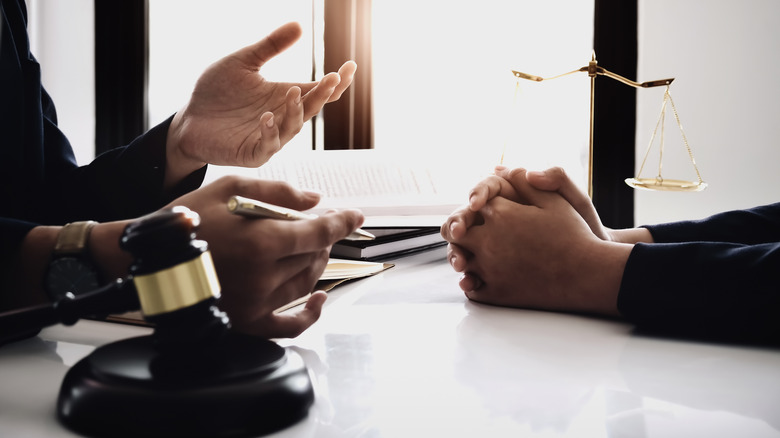Can You Use Repressed Memories As Evidence In Court?
Just as memory cards can manage, save, and recall data, the entire concept behind it comes from the human brain. And that's what memory is. Our ability to remember things from an hour ago to decades ago is all thanks to this multifaceted function. Per Harvard, memory is the end result of what happens when we store information and do so for a long time. It's the reason why once we learn how to do something, we don't have to reteach ourselves how to do it. That is of course depending on how well you retain the memory.
It is possible to form good memories and bad memories, but research shows that the bad ones tend to be remembered more clearly, per The Washington Post. And when a negative memory is the result of something extremely traumatic, the brain does this thing where it tries to hide it, says Northwestern Medicine. In most cases it is only temporary, but in some cases if the memory remains hidden, then it can end up becoming repressed.
Repressed memory brought to the courts
If that happens, bringing back the memory is likely to be recalled only when a situation may remind one of the trauma that led to the memory being suppressed. That is such the case with Eileen Franklin — a California woman who testified against her father in a 1989 case where the majority of the evidence was based on repressed memories that she started to remember.
She told police that she witnessed her father commit the murder of her childhood best friend Susan Nason in 1969. Her memory, which came some 20 years after the fact, was extremely vivid. Coupled with the fact that her father was found to have pornographic images of children in his possession, her father George Franklin was arrested, charged, and tried for the crime. It led to his 1990 conviction. But just six years later, he'd be released and DNA exonerated him from any involvement in the 1969 crime, (via National Registry of Exonerations). Some issues had arisen when other memories his daughter recalled were proved to be false.
The validity of repressed memories
The case of George Franklin was the first of its kind. No one had ever been convicted in a case where the basis of it was solely based on someone's old memories coming to recollection (via The Guardian). But simply because Eileen Franklin's memories weren't credible, doesn't discount the validity of repressed memories. However, the reliability of memories as evidence and testimony is a shaky one in courts today. According to Psychology Today, repressed memory mostly comes to the forefront in the courtroom in cases of child abuse. For the most part, though, there is no single answer for how a court can deal with repressed memories in a case. It is all dependent on the jurisdiction the courthouse is in, whether the judge considers it to be reliable or sufficient in a case, and if said memory is deemed a false one or not.
Some states also have statute of limitations that hinder any investigation. At the same time, if a repressed memory is used in court as evidence, also comes the requirement to prove and demonstrate how the victim came into recollection with their memory. Controversially enough, there is also skepticism raised if a therapist is believed to have embedded the memory in the mind of their patient, says Legal Match. Which, in turn, leaves the repressed memory a subject the remains up in the air. So it really comes down to a lawyer taking the risk of using it in court.


